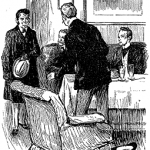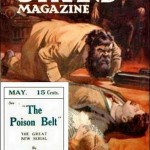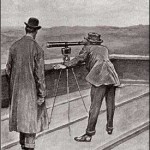“And suppose I refuse?”
“Ah! but you wouldn’t—you couldn’t,” the major said suavely. “Ged, sir, I haven’t known ye long, but I have far too high an opinion of ye to suppose ye could do anything so foolish. If you refuse, your speculation is thrown away. There’s no help for it. Bedad, it would be painful for me to have to blow the gaff; but you know the old saying, that ‘charity begins at home.’ You must sell your knowledge at the best market.”
Girdlestone thought intently for a minute or two, with his great eyebrows drawn down over his little restless eyes.
“You said to my son,” he remarked at last, “that you were too honourable to embark in our undertaking. Do you consider it honourable to make use of knowledge gained in confidence for the purpose of extorting money?”
“Me dear sir,” answered the major, holding up his hand deprecatingly, “you put me in the painful position of having to explain meself in plain words. If I saw a man about to do a murther, I should think nothing of murthering him. If I saw a pickpocket at work, I’d pick his pocket, and think it good fun to do it. Now, this little business of yours is— well, we’ll say unusual, and if what I do seems a little unusual too, it’s to be excused. Ye can’t throw stones at every one, me boy, and then be surprised when some one throws one at you. You bite the diamond holders, d’ye see, and I take a little nibble at you. It’s all fair enough.”
The merchant reflected again for some moments. “Suppose we agree to purchasing your silence at this price,” he said, “what guarantee have we that you will not come and extort more money, or that you may not betray our secret after all?”
“The honour of a soldier and a gintleman,” answered the major, rising and tapping his chest with two fingers of his right hand.
A slight sneer played over Girdlestone’s pale face, but he made no remark. “We are in your power,” he said, and have no resource but to submit to your terms. You said five hundred pounds?”
“A thousand,” the major answered cheerfully.
“It’s a great sum of money.”
“Deuce of a lot!” said the veteran cordially.
“Well, you shall have it. I will communicate with you.” Girdlestone rose as if to terminate the interview.
The major made no remark, but he showed his white teeth again, and tapped Mr. Girdlestone’s cheque-book with the silver head of his walking-stick.
“What! Now?”
“Yes, now.”
The two looked at each other for a moment and the merchant sat down again and scribbled out a cheque, which he tossed to his companion. The latter looked it over carefully, took a fat little pocket-book from the depths of his breast pocket, and having placed the precious slip of paper in it, laboriously pushed it back into its receptacle. Then he very slowly and methodically picked up his jaunty curly-brimmed hat and shining kid gloves, and with a cheery nod to his companion, who answered it with a scowl, he swaggered off into the counting-house. There he shook hands with Tom, whom he had known for some months, and having made three successive offers—one to stand immediately an unlimited quantity of champagne, a second to play him five hundred up for anything he would name, and a third to lay a tenner for him at 7 to 4 on Amelia for the Oaks—all of which offers were declined with thanks—he bowed himself out, leaving a vague memory of smiles, shirt collars, and gaiters in the minds of the awe-struck Clerks.
Whatever an impartial judge might think of the means whereby Major Tobias Clutterbuck had successfully screwed a thousand pounds out of the firm of Girdlestone, it is quite certain that that gentleman’s seasoned conscience did not reproach him in the least degree. On the contrary, his whole being seemed saturated and impregnated with the wildest hilarity and delight. Twice in less than a hundred yards, he was compelled to stop and lean upon his cane owing to the breathlessness which supervened upon his attempts to smother the delighted chuckles which came surging up from the inmost recesses of his capacious frame. At the second halt he wriggled his hand inside his tight-breasted coat, and after as many contortions as though he were about to shed that garment as a snake does its skin, he produced once more the little fat pocket-book. From it he extracted the cheque and looked it over lovingly. Then he hailed a passing hansom. “Drive to the Capital and Counties Bank,” he said. It had struck him that since the firm was in a shaky state he had better draw the money as soon as possible.
In the bank a gloomy-looking cashier took the cheque and stared at it somewhat longer than the occasion seemed to demand. It was but a few minutes, yet it appeared a very long time to the major.
“How will you have it?” he asked at last, in a mournful voice. It tends to make a man cynical when he spends his days in handling untold riches while his wife and six children are struggling to make both ends meet at home.





